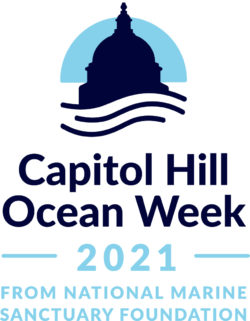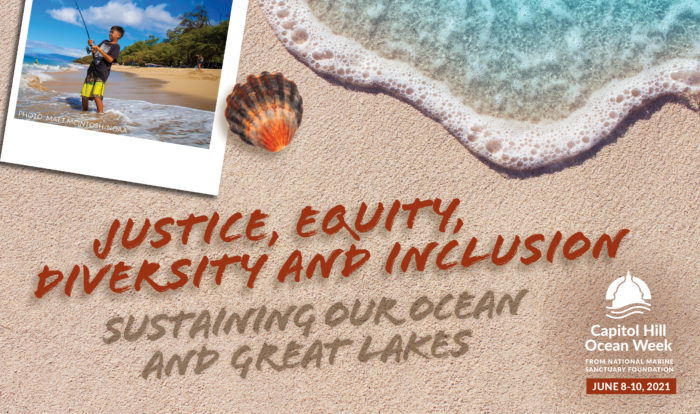Capitol Hill Ocean Week 2021

The National Marine Sanctuary Foundation hosted the second virtual Capitol Hill Ocean Week on June 8-10, 2021, centered on achieving justice, equity, diversity and inclusion in our ocean and Great Lakes.
Achieving bold, lasting change in ocean, coastal, and Great Lakes policy will require us all to listen to the wisdom, perspectives and values of the communities carrying the greatest burdens of environmental inequities. CHOW 2021 offered an opportunity to examine how exclusionary practices and systemic racism negatively impact conservation, science, and policy. And, how anti-oppression and anti-racism work will improve the health and quality of life of people, as well as the sustainability of our ocean, coasts, and Great Lakes and the communities that depend on them.
We are grateful to our generous sponsors, partners, and all our participants. It is with your collaboration and support that Capitol Hill Ocean Week continues to be a success year after year.
For questions about the CHOW 2021 archive, or information about future CHOW events, contact conference@marinesanctuary.org.

Opening Remarks
Opening Ceremony and Opening Plenary
Speakers: Yoshitaka Ota, Ph.D. (moderator), Marce Gutiérrez-Graudiņš, Jacqueline Patterson, Michael E. Roberts, Summer Lee Haunani Sylva, J.D.
CHOW 2021 began with a circle of connection. Representatives from across the country and the world offered traditional blessings and tributes to their lands, communities, and waters that sustain them. The opening plenary soon followed, offering discussion on how to build a just movement for ocean and coastal conversation. Among other key take-aways, panelists highlighted the need for a focus on transfer of power and sharing of resources vs. mere conversation, a need for the uplift of groups already doing JEDI work, and a need for people-focused conservation.
Plenary Sessions- Day One
Speakers: Ambrose Jearld Jr., PhD, MS. BS. (moderator), Mary Beth Jäger, Julie Patton Lawson, Pepper Roussel, Eugenio Piñeiro-Soler, JD
This session addressed the experiences of communities working on sustainable food systems and the strategies that can be deployed to expand access to food security and address injustices in their waters. Panelists offered a few key takeaways:
- Justice can mean different things for different stakeholder groups and injustices in food resource access are often interconnected.
- Governing frameworks must create solutions to food resource issues that do not introduce new barriers to access, especially financial cost. Governing frameworks must ensure some level of equity.
- Representation in government will help ensure equitable power distribution and creation of fair laws.
Speakers: Esther Kia’āina (moderator), The Honorable Talauega Eleasalo Vaalele Ale, The Honorable Sheila Babauta, Kemit-Amon Lewis, Lirio Márquez-D’Acunti, Austin J. Shelton, Ph.D.
Home to more than 4 million people, the islands of Puerto Rico, U.S. Virgin Islands, Commonwealth of the Northern Marianas, American Samoa and Guam sit on the frontlines of a rapidly accelerating climate crisis. Yet, as our panelists highlighted, they remain on the periphery of U.S. ocean and climate policy. Speakers noted the myriad ways in which U.S. policy making structures make it challenging or impossible to meaningfully participate in dialogue and voiced a desire to be included. Panelists also noted that funding for local education, climate change resilience projects, community support, and conservation efforts should constitute top priorities going forward.
Speakers: Monica Patrice Barra, Ph.D. (moderator), Victoria Herrmann Ph.D., Sandy Ha Nguyen, Colette Pichon Battle, Esq.
Seascapes and coastal landscapes are experiencing rapid change as the climate crisis accelerates, with many communities working to define the future of their health and livelihoods to ensure survival. This inspiring panel highlighted just a few of the individuals striving to protect the quality of life in their communities. They discussed the exclusion of indigenous voices in the design of actionable climate solutions, noting that ‘resilience’ itself is a colonialist term which obscures the systemically racist and prejudiced structures that have forced these communities to be resilient in the first place. They also emphasized the need for proactive education efforts for local communities to aid with engagement in policy, ecosystem sciences and economic development.
Plenary Sessions - Day Two
- Blue Introspection: Examining Justice, Equity, Diversity, and Inclusion in Ocean and Great Lakes Policy, Science, and Conservation
- Eye on the Horizon: Culture and Protected Waters
- Indigenous and Local Knowledge and Wisdom for Strengthening Conservation
- Exploring the Intersection of International Policy and Communities
Speakers: Whitney Tome (moderator), Andrés Jimenez, Quentin Tyler Ph.D., Jalonne L. White-Newsome, Ph.D., Francisco “Paco” Ollervides, Leonard Pace, Chanté Coleman
How would marine and freshwater science, management and policy change if our workplaces reflected the racial and ethnic diversity of our nation? Each of the innovators in this session had a story to tell that addressed this question. Panelists described their career journeys, how they are shifting ocean policy for the future through love, power, radical intentions and culture shift, and how they are challenging the status quo by being more inclusive of new perspectives and voices.
Speakers: Kris Sarri (moderator), Keola Lindsay, Janine Ledford, Violet Sage Walker, Justin Dunnavant, Ph.D.
Protected areas need to represent the full breadth of experiences of people living in the United States and honor co-design and co-management with Indigenous and local communities. This session highlighted efforts to make our National Marine Sanctuary System and marine monuments more inclusive of all people as well as key next steps. Speakers noted that communities/cultures must be engaged as equal partners in protected area management, that having a clear understanding of past and present community connection and stewardship is key to effective protection, and that conservation may not mean the same thing to all stakeholders involved.
Speakers: Kyle Whyte, Ph.D. (moderator), Ilarion ‘Kuuyux’ Merculieff, Shavonne F. Smith, Dr. Ayana Omilade Flewellen, Allison Smart
Though Indigenous knowledge and wisdom strengthens our understanding of the planet and improves decision-making, national and global discussions often fail to consider it. Indigenous and traditional communities need allies and funders who support their efforts to develop their own organized systems that increase their presence while developing the capacity to respond to the needs of Western science. This panel highlighted the importance of tangible steps to create connections between indigenous and local knowledge and wisdom and western science and institutions. A few of these included treating knowledge givers as consultants (not volunteers), to eliminate competition for funding between tribal nations by increasing resources available, and emphasizing that scientists ought to be students of transdisciplinary and holistic knowledge, rather than perceiving themselves as the experts.
Speakers: Nathan J. Bennett, Ph.D., Queen Quet, Sophia Kianni, Nisreen Elsaim, Cheryl Andrews-Maltais
Climate change and sustainable development are a common concern to humankind. The Paris Agreement, the UN Sustainable Development Goals, and the Convention on Biological Diversity recognize that the rights of Indigenous peoples and local communities should be respected, promoted and considered in policy agreements. This plenary focused on how these international mandates and discussions can better provide a key platform for building access and power into policy-making. Panelists emphasized the importance of recognizing and ensuring strong representation of indigenous people and local communities in international and national policy discussions, that organizations and governments working in the ocean space must account for the voices, rights and needs of indigenous people and local communities in their deliberations, and that financial support ought to be provided local communities to ensure their involvement is possible, among other conclusions.
Plenary Sessions - Day Three
Speakers: Russell F. Smith (moderator), Taqulik Hepa, Nahal Ghoghaie, Joe Oatman, Les W. Burke, JD
In 2022, the nation will celebrate the 50th anniversary of major environmental legislation, including the National Marine Sanctuary Act (part of the Ocean Dumping Act), the Coastal Zone Management Act, and Marine Mammal Protection Act. Congress is also considering legislation to reauthorize the Magnuson-Stevens Fisheries Conservation and Management Act and address climate change and the ocean. This plenary examined federal legislative and executive policies that can move us towards a deeper integration of justice and equity principles. Throughout the dialogue, panelists emphasized the key importance of including and considering local ecological knowledge in decision making. Speakers also highlighted the need for accessible communication strategies and the use of environmental policy language legible to all stakeholders affected or involved.
Speakers: Felipe Benítez (moderator), Taishya Adams, Margaret Gordon, Nils Bolgen
Federal, state, and local policy can promote a just transition to a sustainable blue economy by making infrastructure more resilient and investing in nature-based solutions; fostering job training and creation in blue industries such as restoration; and, supporting access to our ocean, coasts, and Great Lakes. This panel focused on how to build back bluer to support the U.S. economy and competitiveness. Panelists noted that communities should be at the table in economic development planning, that they should be supported financially in doing so (with access and equity constituting two different ideas), and that building diversity, equity, and inclusion for programs that impact jobs, health, and education is an active process and takes a defined plan.
Speakers: Kevin T. Bryan (moderator), David Riera, Helen Smith, Raimundo Espinosa, Trisha Kehaulani Watson, Jaylene Wheeler, Alexa Lawrence
Building on all previous conversations, members of the CHOW Advisory Committee explored the priorities that emerged to guide the basis of an agenda to deepen justice and equity in ocean, coastal and Great Lakes conservation, science and policy. They honed in on the importance of acknowledging and apologizing for past wrongdoing, engaging in meaningful and committed action and allyship, representation for communities that have not historically had a seat at the table (especially for U.S. territories), and the importance of conservation leaders to self-educate on issues of justice, equity, diversity, and inclusion.
